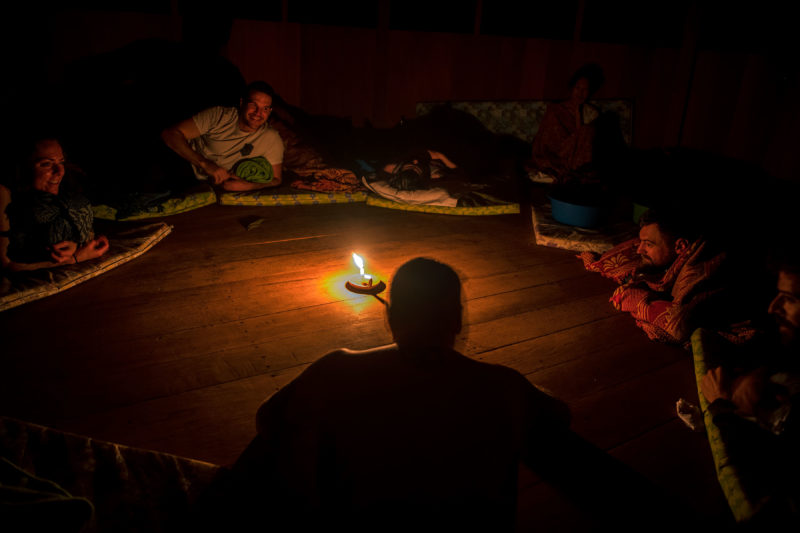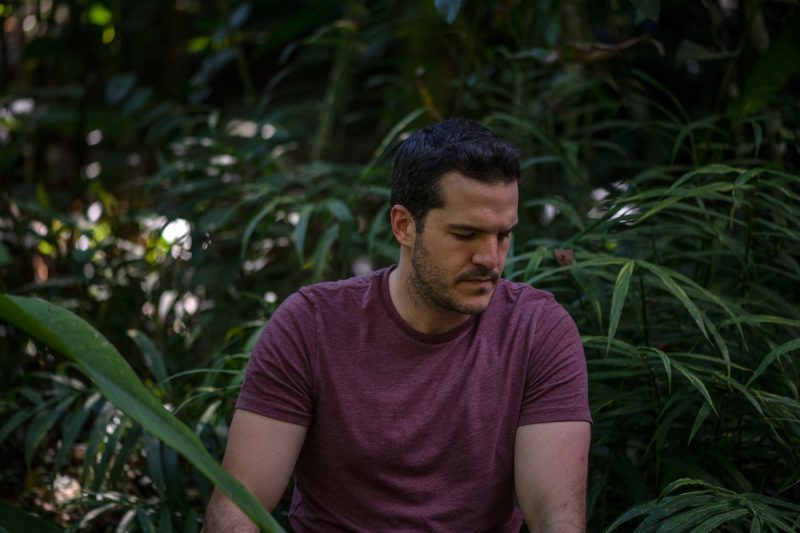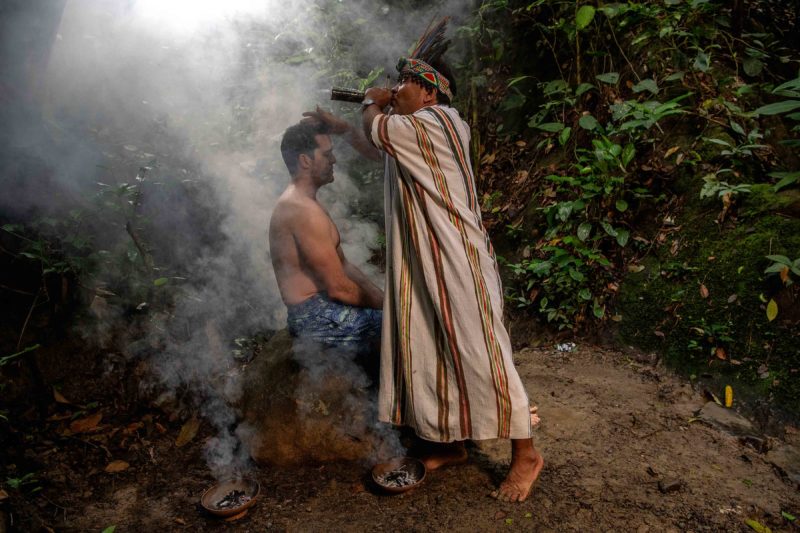New Dawn of Psychedelic Therapies and Research Take Root in Texas
By Jessica Lenamond
Reporting Texas

Jesse Gould, founder of the Heroic Hearts Project, at an ayahuasca retreat in South America. Ayahuasca, a plant-based tea, is traditionally used in religious ceremonies, but has recently been sought out by veterans for the treatment of PTSD. Photos Courtesy of Jesse Gould
A little over five years ago, Jesse Gould booked a solo trip to Peru in an attempt to save his life.
Gould, in his early forties at the time, was in search of the mind-altering hallucinogen ayahuasca—a plant-based brew traditionally used in South American religious ceremonies or for medicinal and ritualistic uses, with the guidance of a shaman. The former U.S. Army Ranger needed help as soon as possible, even if that meant seeking treatment in another country.
“I was at that spot where if I kept on my path, it would have ended horribly for me,” Gould said. “I knew at the end of the day, I wasn’t happy. I didn’t know what that would lead to, but it wasn’t good. On the other side, [there’s] this other experience that I’m a little afraid and uncertain of, but let’s give it a shot. What’s the worst that it could do?”
Today, the face and reputation of the transcendent psychedelic trips of the 1960s has surely changed from the likes of long-haired hippies and shaggy-haired rock stars. Now, a more unexpected group is advocating psychedelic-assisted therapies for the treatment of post-traumatic stress disorder, or PTSD, and severe depression and anxiety. In response to the veteran suicide epidemic that has taken over 30,000 lives since 9/11, former service members have become prominent lobbyists for the rebirth of psychedelic therapies and research. Droves of veterans already travel south of our border to seek these treatments. For some, out of pure desperation. For many, it is a last-ditch effort to regain mental stability and their life.
The current federal system in place to support veterans when they return from combat, the U.S. Department of Veterans Affairs, is already overwhelmed with supporting Vietnam War and other earlier-era vets as well as soldiers returning from decades of conflicts in the Middle East. With the recent turbulent withdrawal from the 20-year war in Afghanistan, advocates warn that a “tidal wave” of suicides and mental health crises will arise as the thousands deployed are left unsupported when they return home.
During the last regular Texas legislative session, House Bill 1802 was adopted, allowing studies on “alternative treatments” for veterans’ PTSD. Even before HB 1802, researchers at the University of Texas at Austin’s Dell Medical School were beginning to form the Center for Psychedelic Research and Therapy, which will start its studies on psychedelic-assisted treatments by the fall, said Dr. Greg Fonzo, co-lead of the Center and an associate professor in the Department of Psychiatry and Behavioral Sciences. Although veterans with PTSD are the major reason why this new dawn of research has begun, there is also a lingering sense that wide support for these therapies benefitting more than just veterans is coming soon.

Jesse Gould, a combat veteran established Heroic Hearts Project, an effort to help other veterans seek psychedelic-assisted therapies in other countries – therapies that will soon be studied at the University of Texas’ Dell Medical School.
After graduating from Cornell University in 2009, Gould joined the Army and completed three combat deployments to Afghanistan. When he returned to being a civilian, Gould describes living a double life, in which he drank alcohol “a lot on the weekend” or while at home.
“I was struggling on the inside, it was a mess,” Gould said. “But on the outside, I was still highly functional to where I was doing well at my job. People who knew me on the outside might’ve not known that I was able to hide it, compartmentalize it and still function.”

Veterans are flocking to South America to receive therapies using a hallucinogenic tea, a plant cocktail banned in the U.S., but sought by U.S. combat veterans as a last hope for mental stability or avoiding suicide.
Before seeking out psychedelic-assisted therapy at the retreat in Peru, Gould first tried many other widely accepted treatments, essentially mindfulness practices, or what he calls self-help: using meditation apps, starting new hobbies, exercising. He would try nearly anything, except the pharmaceutical medications the VA protocol requires for treating PTSD. The second half of that protocol requires some sort of cognitive behavioral talk therapy, Gould said.
Gould originally sought help from the VA because he could not afford a therapist at the time. But when the VA would not offer therapy without also prescribing medication, Gould viewed the department as a dead-end.
“When the VA essentially was not helpful, I just found myself in a situation where it didn’t seem like the professionals really understood what was going on or could help me,” Gould said.
“I couldn’t afford anything. So I was stuck. I was in the situation of, ‘Well, what do I do, if the professionals that are supposed to help me can’t even help me?’ It was around that time, fortuitously, that I heard about ayahuasca.”
In the U.S. there are two FDA-approved medications for the treatment of PTSD, Prozac and Zoloft. Both have been approved for the last 20 years, and neither target suicidal thoughts, clinical research psychologist Lynnette Averill said in testimony before the House Committee on Public Health during the 87th regular Texas legislative session. This slow pace of approval for the treatment of PTSD concerns those witnessing the veteran suicide epidemic, which takes about 20 lives per day. What’s more, Averill said these medications are slow-acting and less than 30% of individuals actually receive their clinical benefits—a number thought to be significantly lower among trauma exposed veterans.
Gould said he didn’t feel personally ready to start medication, because he’d seen dual effects.
“I’ve definitely seen people that it saved their life,” Gould said. “But I’ve also seen people that it essentially took their life spark from them. They weren’t suffering as much, but they also weren’t enjoying or experiencing life as much. It almost made them a robot.”
The lead sponsor of HB 1802, Democratic State Rep. Alex Dominguez, similarly was disturbed by the reliance on SSRIs and SNRIs, or antidepressants, for the treatment of PTSD when his own work led him to the little evidence-based research that exists on psychedelic-assisted therapies.
“For a number of people that have PTSD, when they take these medications it normally leaves them in a zombie-like state,” Dominguez said. “They feel disassociated from the world and their loved ones. I’ve had a number of family members tell me that they don’t even recognize the person they’re married to, because of the medicine that they have to take just to be somewhat functional.”
Before Dominguez became a legislator, he was a prosecutor and defense attorney in Cameron County in South Texas. It was there he recognized that a number of people going through the court system are veterans abusing controlled substances to self-medicate.
“For many of them, an intervention and therapy was able to get them to work off their addiction,” Dominguez said. “But it didn’t cure the underlying problems they have, which is PTSD.”
A self-proclaimed voracious reader, Dominguez then started his own research, looking at scientific findings coming out of Australia, Israel and the United Kingdom on the study of psychedelic medicines. Dominguez said he began to wonder, “Why aren’t we doing this in the United States?”
He soon learned from history.
The Controlled Substances Act of 1970 banned all manufacturing, importation and possession of certain narcotics, stimulants, hallucinogens and other drugs based on the “substance’s medical use, potential for abuse and safety or dependence liability.” The federal policy was in part an attempt to stop the surge of young adults’ experimentation with the hallucinogens associated with pop culture at the time. The Act stopped all clinical trials and medical research on alternative therapies in the country.
Considering Texas has the second largest veteran population in the U.S., Dominguez knew he had to address this crisis from a state level. He also recognized his disadvantage as a member of the Democratic Party during the last legislative session. A surprising assistant was crucial, though, in helping Dominguez gain overwhelming bipartisan support for HB 1802. Three out of the five authors of the bill are Republican.
Then former Gov. Rick Perry contacted Dominguez early last spring.
“He wanted to have a sit down,” Dominguez said. “He vetted me to make sure I wasn’t a crackpot, and from there, we began a number of discussions putting together a strong team of witnesses and advocates. The history in Texas of even medical cannabis use has been a very slow process in getting people to even consider that type of treatment. So you can imagine how hard it was to bring up the topic of psychedelics being used in the state of Texas.”
The stigmas surrounding psychedelics use were certainly not ignored last April when HB 1802 was introduced before the House Committee on Public Health. One advocate, Morgan Luttrell, went as far as admitting that any time psychedelic medication studies or research proposals used to land on his desk, they “immediately hit the trash can.”
After Luttrell medically retired from Naval Special Warfare Command in 2014, the now-congressman worked with neuroscientists and psychologists on finding treatments for traumatic brain injury, PTSD, chronic pain and many other invisible injuries of war.
“The thought of psychedelic therapies was completely taboo to me, and I would not have it,” Luttrell said. “Fast forward a few years, I see the writing on the wall as a researcher and a veteran. If we can get past the taboo of the word psychedelic medicine … it makes me cringe to say it. I hate the word hallucinogens. I hate the word psychedelics. To date, I’ve never seen any other medications or approved treatments have effects like these plant-based medicines are having on our veterans.”
After several more testimonies from veterans and researchers explaining the life-saving work of psychedelic-assisted therapies, HB 1802 flew through both chambers. Gov. Greg Abbott did not sign the bill into law nor veto it.
Other states are following Texas’ lead, and advocates hope federal action is not too far behind. Dominguez said several states, including Florida and New York, have introduced similar bills since what he calls the “Texas miracle.”
“We often think of government as being non-functioning because of partisan politics,” Dominguez said. “This is an example of the good work we can accomplish when we set aside partisan differences and focus on a solution for people who have a very real problem.”
Averill, who is leading the study HB 1802 permitted with Baylor College of Medicine, will join Dominguez and other South by Southwest panelists on March 15 for a conversation on psychedelic-assisted therapies and their use for people other than veterans with PTSD.
Soon after Gould’s experience with ayahuasca, he founded the Heroic Hearts Project, the first nonprofit to facilitate the passage of veterans to South American countries for psychedelic-assisted therapies. So far, Heroic Hearts has raised about $750,000 in scholarships for the retreats and has helped about 150 veterans seek treatment, Gould said. The organization’s waitlist sits at about 1,000 applicants longing to receive help, and that is without any outreach efforts so far.
UT Austin’s Center for Psychedelic Research and Therapy is partnering with Heroic Hearts for some of its studies, the first of which focuses on helping spouses that lost loved ones in service with psilocybin treatment, or the psychedelic compound in some mushrooms. The second study will observe veterans with PTSD who go through ayahuasca ceremonies, and the third study is on ibogaine, an African plant thought to be beneficial for physical head trauma in Special Operations veterans, Gould said.
“We look forward to just seeing what the research uncovers, because we are still very early in the complete understanding of these modalities,” Gould said. “This research will be extremely pivotal in terms of how we treat future veteran trauma. It’s exciting that we’re all on this ground floor of so much potential for the future and real, real changes and paradigm shifts in how we view and treat mental health.”